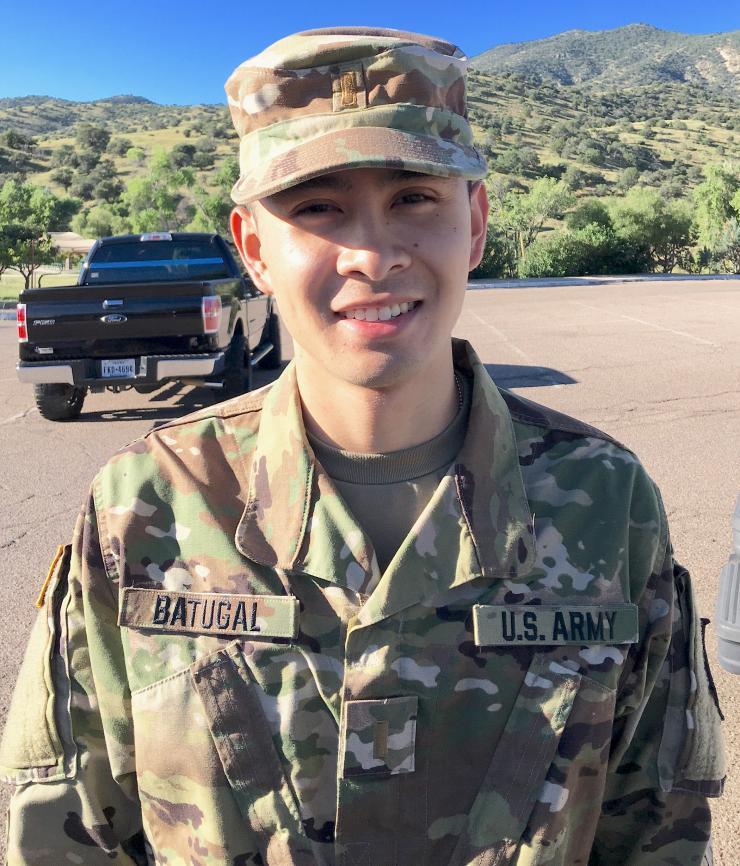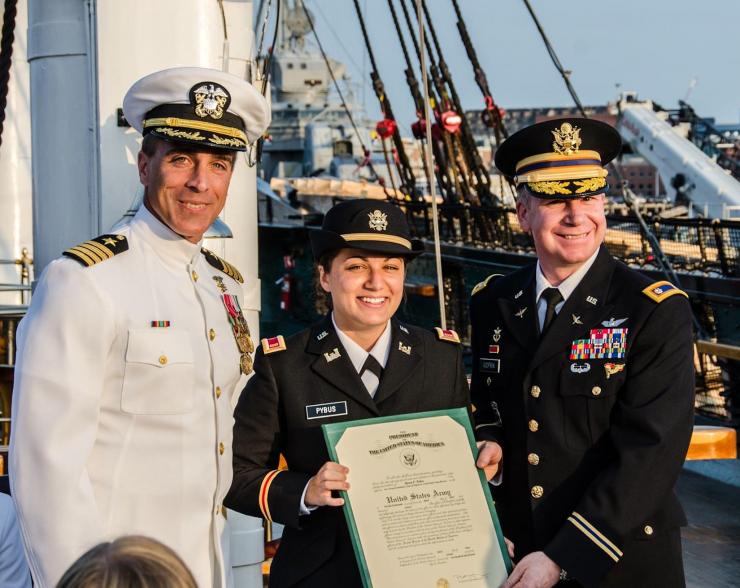Serving a Larger Cause

Troy Batugal
Of course Alyssa Pybus was a cross-country runner in high school.
A first-year student in the BioEngineering Graduate Program, headquartered at the Petit Institute for Bioengineering and Bioscience at the Georgia Institute of Technology, Pybus spent her childhood moving across country, across oceans, across the planet.
“That’s life in a military family,” says Pybus, whose home school is the Wallace H. Coulter Department of Biomedical Engineering.
She enjoyed the life, so when it was her time, she also chose to serve in the military. Pybus, who earned her undergraduate degree in bioengineering at the Massachusetts Institute of Technology (MIT), is now a second lieutenant in the U.S. Army Reserves.
“I guess that makes me kind of the black sheep of the family,” she adds, smiling, because her father, two brothers and sister are in the Navy, all of which means Veterans Day is something like a family holiday for the Pybus clan.
That dedication to serving a larger cause, a trait Pybus says she inherited from her father, is shared by her fellow BioE grad student, Troy Batugal, an Army reservist who is currently attending mandated Basic Officer Leader Course (BOLC) in military intelligence, a four-month training exercise at Fort Huachuca, Arizona.
Like Pybus, Batugal was inspired by his family to serve.
“My father is a doctor and my mother is a nurse, so I grew up around healthcare, and this concept of helping others, of service to others. That influenced my decision to serve in the military,” says Batugal, a second-year grad student who earned his undergraduate degree from Cornell University.
Both BioE students were involved in ROTC. They were commissioned as second lieutenants upon earning their undergraduate degrees and successfully completing their ROTC commitments.
“That ROTC experience was so valuable,” says Batugal, whose academic base at Georgia Tech is the School of Materials Science and Engineering. “ROTC helped pay for my undergraduate education, but more important, it made Georgia Tech possible because of the discipline it taught me, the lessons in time management.”
Batugal, who grew up in Las Vegas, Nevada, works and studies in the lab of Ravi Kane, a Petit Institute researcher and professor in the School of Chemical and Biomolecular Engineering, whose group specializes in the design of polyvalent ligands. It’s not exactly the path Batugal expected years ago.
“I wanted to be a physician for a long time, up until my early undergraduate years,” he says. “That’s when I really got into engineering, particularly materials science engineering. I discovered the biomedical applications of materials, discovered how versatile polymers were, how they can be used in a medical environment, and that led me to bioengineering.”
Going forward, Batugal says he’d like to continue lab research, perhaps working in government, combining his bioengineering background with his Army specialty – military intelligence. “I went in that direction because I wanted to pick up new skills that were very different from engineering,” Batugal says.
Meanwhile, Pybus wanted experience in engineering of a different sort. At Georgia Tech, she works in the lab of Petit Institute researcher Levi Wood, an assistant professor in the School of Mechanical Engineering, whose work is focused on applying systems analysis approaches and engineering tools to identify novel therapeutic targets for inflammatory diseases, such as Alzheimer’s disease.
In the Army, she’s part of a construction company, the platoon leader for about 25 Army engineers (plumbers, electricians, carpenters, heavy equipment operators, and so forth). The main task is planning, designing and constructing roads and buildings. Like Batugal, the ROTC experience gave her an appreciation for time management, mentorship, “and how to tactfully get things done. I developed good leadership skills and organizational skills balancing classes and ROTC while I was at MIT,” she says.
But her experience as a military kid taught Pybus how to roll with the punches and get used to new environments. Her past addresses include North Carolina, Virginia, Panama, Rhode Island, Germany, Tennessee, Florida, California, Hawaii (where she did most of her high school), Bolivia and two weeks in Bahrain.
When she was considering her military options, Pybus was leaning toward active duty, the fulltime option. It wasn’t until her senior year at MIT, after spending a summer doing research that she decided on the best of both worlds: grad school and military service.
“I really liked the research and when I heard my friends talking about their grad school plans, I thought more about it and realized that this was what I really wanted, long-term,” says Pybus. “So I can still serve in the military as a reservist, but my primary focus is going to be on bioengineering, because I realized that this kind of research is just another form of public service.”
CONTACT:
Jerry Grillo
Communications Officer II
Parker H. Petit Institute for
Bioengineering and Bioscience

Alyssa Pybus is a second lieutenant in the U.S. Army Reserves.
